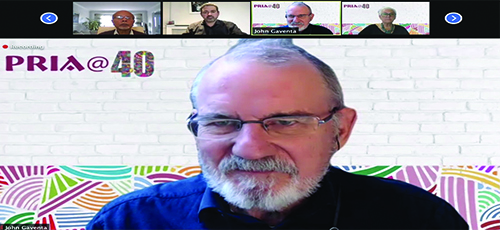It was in 1976 that a group of interested persons across North America first met to discuss Participatory Research (PR) as an alternative means of research and use of knowledge for social change. In 1980, the first international meeting on Participatory Research was held in Ljubljana (in former Yugoslavia), attended by early pioneers of this ‘movement’ (Budd Hall, John Gaventa, Ted Jackson, Helen Lewis, Orlando Fals Borda, Rajesh Tandon, to name a few). The discussions from this meeting, and of the practice and theorising of Participatory Research over the next decade, began to be circulated internationally and regionally in cyclostyled newsletters, articles in now-defunded journals, and documentation of conference proceedings. Knowledge produced by social movements, in civil society, political organisations and in academia was synthesized and presented in an array of forms – text, statistics, drama, poetry, video, learning games. Such locally created and owned knowledge, used as tools to build capacities of community and social organisations in the Global South, contributed to the steady spread and sustained development of the theory and practice of Participatory Research.

The origins and history of the development of the field of Participatory Research has largely remained undocumented, though it is a significant part of the oral tradition of its ‘elders’ who spearheaded the movement.
“The Story of Participatory Research: History and Future” was a seminal event celebrating 40 years of PRIA, in which the knowledge and experience of the ‘elders’ of Participatory Research was central, and it was hosted in partnership with the UNESCO Chair in Community Based Research and Social Responsibility in Higher Education, on 16 December 2021, between 7.30 pm and 9.30 pm IST (2 p.m. to 4 p.m. GMT; 9.00 a.m. – 11 a.m. Colombia, EST Canada and USA; 6.00 a.m. – 8.00 a.m. BC, Canada).
A lesson in history, along with explorations of its contemporary manifestations, spotlights the relevance of community-based, participatory research in a post-pandemic world. The symposium explored the following questions:
- why is it important for researchers to make research relevant to and for the people,? We will learn from the experience of the ‘elders’ and pioneers of Participatory Research.
- what strategies, with leadership from the Global South, is required to re-energise similar and different others to overcome a tired-ness/co-option of using Participatory Research, and to build capacities to use research for social transformation?
LIVE ENGLISH-SPANISH TRANSLATION (supported by Department of Politics, University of Sheffield, UK)
Panelists:
Dr Budd Hall, Senior Associate, Centre for Global Studies; Professor Emeritus, Public Administration, University of Victoria, Canada
Dr Rajesh Tandon, Founder-President, PRIA, India
Dr Edward Jackson, Adjunct Research Professor, School of Public Policy and Administration, Carleton University, and Senior Research Fellow, Carleton Centre for Community Innovation, Canada
Dr John Gaventa, Institute of Development Studies, Sussex, UK
Dr Patricia Maguire, Professor Emeritus of Education and Counseling, Western New Mexico University ‑ Gallup Graduate Studies Center, USA
Dr Yusuf Kassam, Independent Participatory Researcher, Canada
Dr. Deborah Barndt, Professor Emerita, York University, Toronto, Canada
Prof. Normando Suarez, Assoc Prof in Sociology Department, UNAL, Colombia
In conversation with:
Juan Mario Diaz Arevalo, Department of Politics and International Relations, University of Sheffield and Sumitra Srinivasan, PRIA, India
Read the event report here: https://www.pria.org/knowledge_resource/1640460094_WBR%2021_Story%20of%20Participatory%20Research.pdf




